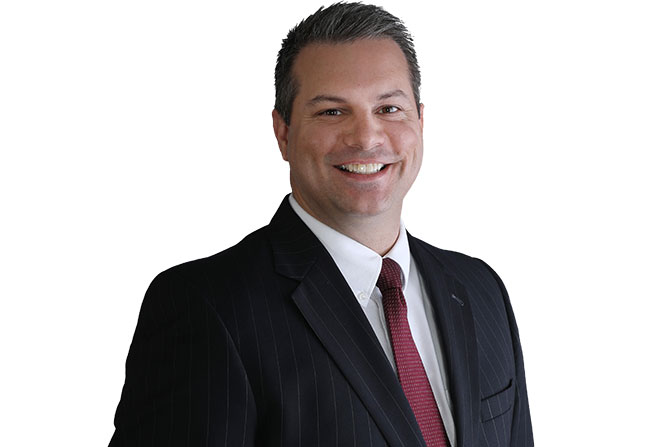By The Missouri Independent Bankers Association
Andrew Lee has a favorite quote by John Lennon: “Life is what happens to you while you are busy making other plans.” According to Andrew, it’s been a mantra he lives by, “If things are not so great, something great comes along. If things are going really well for too long, I get checked with a learning experience. Things balance. It makes the good and the bad make sense, and I think it helps me keep perspective in my life and the banking industry as well, for that matter.”
In spring 2006, it was time for Andrew to do something new. He was working as the media and community relations manager for a professional indoor soccer team, the St. Louis Steamers, and he was also doing some work for a local television station. It became clear the that the St. Louis Steamers weren’t going to be around (The current St. Louis Steamers team is a women’s soccer team with a program to train young players.)
Andrew wanted to change directions. He had some family in Columbia, Missouri, so Andrew decided to relocate there and start his second career.
That meant starting from the ground up. Andrew got a job primarily taking phone calls and writing emails in Boone County National Bank’s customer service department. Boone County National Bank (renamed Central Bank of Boone County June 12, 2015) was part of a 13-bank holding company. He loved it. Andrew eventually moved back to St. Louis, and ended up in various managerial positions on the retail side at Central Bank of St. Louis.
Several people at Boone County, in Columbia and later in St. Louis, had a significant impact on Andrew’s career. “They had more faith in me than I did,” he said. “It was flattering and humbling at the same time, and it made a big difference in my career.”
Mary Beth Gillum and Karen Taylor “were two people that gave me a lot of confidence. They taught me the financial industry and also mentored me to manage people.” Back in St. Louis, Tracy Thomas was another key person in Andrew’s career. She gave him encouragement and feedback, and she helped him map out career moves. “She saw the potential in me,” he said. “She has become a good friend.”
Also in St. Louis, Andrew moved into correspondent banking thanks to veteran banker Matt Favazza, who according to Andrew, taught him to be a banker.
Dan Ward, another veteran banker, was also another great mentor. “We were competitors for a number of years,” said Andrew. “Dan taught me that in the correspondent banking world, it’s important to be mindful that our clients — community bankers — have the resources they need all day. We can’t just sell products. We need to understand what bankers go through, find out what their goals are and help them achieve those goals. It’s understanding before walking through the door and preparing for the experience. I am not a salesperson; I am a collaborator — a resource.”
Dan approached Andrew on behalf of Midwest Independent BankersBank because he thought it would be a good fit. Andrew agreed. “I would be working in a banker’s bank, primarily in correspondence banking,” he said.
He has now been with Midwest Independent BankersBank for 14 months. “It was such a good decision,” he says. “I was promised that I would love it here, and I am.” He works from home in St. Louis and travels when necessary to make calls on banks in eastern Missouri. “The transition was smoother because I am working with people I already had relationships with. There are many great people in eastern Missouri that I have been calling on for many years. They are customers and colleagues. It’s the people that make this job rewarding.”
When asked about the most rewarding part of his career, Andrew said, “At times there’s a negative persona about being with the bank, but I think there are many opportunities that banks — more specifically, community banks — offer. Banks build dreams for families and businesses in their communities, and I get to be a small part of that.”
“At times there’s a negative persona about being with the bank, but I think there are many opportunities that banks — more specifically, community banks — offer. Banks build dreams for families and businesses in their communities, and I get to be a small part of that.”
Andrew has learned at least three things that he passes on to anyone he mentors:
- Banking is a business of relationships first and foremost. You can crunch it into numbers, but that is misleading. Banking doesn’t work without friendship.
- While the industry itself is stable, the world of banking does change. You must adapt and learn to be flexible. If you don’t like change, then banking is not the right industry for you.
- It’s a relatively small world, so be kind and respectful, and don’t burn bridges. After 14 years in the banking industry, Andrew is still working with many of the same people.
Andrew also sees benefits from MIBA membership. For one thing, the association is a network of peers. MIBA has been especially helpful during the current pandemic. It is instrumental in providing education and knowledgeable assistance, which in turn suggests a way forward. Although it’s common for some banks to compete, the competition is friendly. He said, “Banking has challenges, just like any industry, and the best way to combat challenges is to be together as a united front.”
The pandemic is a perfect illustration of how a united front can help banks. Andrew said, “Banks overall were more prepared coming into the pandemic recession than we ever were before previous recessions even though we didn’t see it coming. We had strong assets, our capital levels were good, and our loan losses were acceptable. Although we may take a hit in 2021, it will be nothing like 2008-2012.” He added, “I know many people are in hard-hit industries. They are stressed and in a tight situation, and my heart goes out to them. I hope there will be some kind of program to help people get to the finish line together. But we’ve been down this road before. We’ve had practice. I am optimistic about the banking industry and our clients.”
When asked about what he does in his spare time, Andrew says he spends a lot of time with his family and enjoys sports. “I played a lot of sports growing up. I’m a Cardinals and Blues fan, and I’m also a big fan of the University of Missouri athletics. My wife Janna and I have a 6-year-old boy, and we are working on getting him into sports. Fatherhood is important to me.”
Andrew also enjoys reading. He said, “I am rereading Alexander Hamilton’s biography. War history has been a big interest for me, especially the era of the American revolution. Alexander Hamilton was the first secretary of the treasury, and he set up our banking system. That was a massive undertaking and something that, given my choice of careers, has taken on new meaning.”
Working in banking, which Andrew feels is the epitome of balance and perspective has been a great fit for him.






